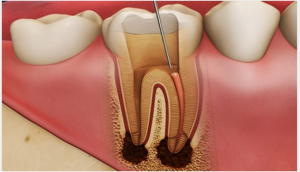Does a Root Canal Treated Tooth Hurt?
Contents
- Does a Root Canal Treated Tooth Hurt?
- What Is Root Canal Treatment?
- Is There Pain After a Root Canal Treatment?
- Signs of a Failed Root Canal Treatment
- After Root Canal Treatment
- What Should You Do After a Root Canal Treatment?
- Frequently Asked Questions
Visiting the dentist can be a stressful experience for many people, especially when it involves a procedure like a root canal. However, root canal treatment can be an important step for your dental health and usually does not cause pain. So, is there pain during or after a root canal treatment? While answering this question, let’s examine how the treatment process works, the possible causes of pain, and what a successful root canal should look like.

What Is Root Canal Treatment?
Root canal treatment is a procedure in which the nerves and blood vessels inside the tooth are removed. If the nerves inside the tooth are damaged due to infection or trauma, this treatment may be necessary. The infected tissues inside the tooth are cleaned, then the space is disinfected and the canal is filled. This treatment is an important alternative to avoid tooth loss and generally prevents the need for extraction.
Although root canal treatment may seem painful, thanks to the anesthesia used during the procedure, patients can go through the process quite comfortably. In fact, the main goal of a root canal is to preserve the tooth and keep it healthy in the long run.
Is There Pain After a Root Canal Treatment?
Some patients may feel mild pain after a root canal, but this is usually a temporary condition. This pain can occur due to pressure applied to the tissues during treatment or as part of the healing process. However, this pain typically subsides within a few days and is usually at a manageable level.
If intense pain is experienced, it could be due to several different reasons. For example, there may be a remaining infection in the tooth or inflammation in the surrounding tissues. Such conditions may require additional treatment.
Signs of a Failed Root Canal Treatment
Not every root canal treatment is successful, and some symptoms may indicate that the treatment has failed. The following situations could be signs of a failed root canal:
- Severe pain: Mild pain for a few days after treatment is normal, but intense and persistent pain may indicate failure.
- Swelling or redness: Swelling or redness in the gums could be a sign of infection.
- Discoloration of the tooth: Darkening or color change in the tooth may indicate post-treatment failure.
- Mobility in the treated tooth: If the tooth becomes loose, it could indicate that the root canal was not successful enough.
If you notice any of these symptoms, it is important to contact your dentist immediately. Early intervention can make the treatment process more effective.
After Root Canal Treatment
How Long Do Dental Crowns Last?
The healing process of the tooth after a root canal typically takes a few weeks. During this period, pain and sensitivity may occur, but this is usually temporary. Post-root canal care is very important; temporary fillings are placed over the treated tooth, followed by permanent fillings or crowns. Regular dental check-ups are necessary to maintain the health of the tooth.
By following your dentist’s care instructions, you can help keep the treated tooth healthy. It is also important to avoid hard foods that could damage the tooth. If you experience severe pain or swelling after the treatment, you should contact your dentist.
What Should You Do After a Root Canal Treatment?
Taking care of your tooth after a root canal and paying attention to the healing process is very important. With proper care, the lifespan of the treated tooth can be extended and the risk of reinfection reduced. Here are some important post-treatment care steps:
- Brush your tooth gently: You should continue brushing your tooth after a root canal, but due to sensitivity, it’s recommended to brush gently.
- Use pain relievers: If you feel mild pain after the treatment, you can take the pain relievers recommended by your dentist.
- Avoid hard foods: Since a temporary filling may have been placed on the treated tooth, it is important to avoid hard foods.
- Do not smoke: Smoking can negatively affect the healing process, so it is important not to smoke after the treatment.
- Do not skip check-ups: Regular dental check-ups are important after a root canal. Your dentist can monitor the healing process and detect potential issues early.
Frequently Asked Questions
Is there pain during a root canal?
- No pain is felt during a root canal because anesthesia is used. The patient is treated comfortably during the procedure.
How can I know if a root canal has failed?
- Severe pain, swelling, or changes in the color of the tooth may indicate a failed treatment.
How long does the pain last after a root canal?
- Pain after a root canal may last a few days and is usually at a tolerable level.
What is the cost of a root canal?
- The cost of a root canal can vary depending on the tooth being treated and the clinic. You can get detailed pricing information from your dentist.


